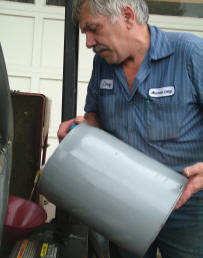Local college producing bio-diesel
Last March I wrote an article about Willie Nelson and his bio-diesel production. Turns out that even a local college has jumped onto this bandwagon! My thanks to Dr.Phil for getting this story to me. From Manchester College:

Students who
eat veggie-fried foods help the environment, College - honest!
What
started curiously with a “What if?” is fueling student lab work,
lessons in environmental science – and Manchester College lawnmowers, a
maintenance van and leaf blowers.
What
if the College converted that used vegetable frying oil from Chartwells
dining service into biodiesel, wondered Jeff Osborne, assistant
professor of chemistry. “The concept of taking a waste product, such as
vegetable oil and converting it into something useful is what I like,”
the scientist noted.
Chartwells was happy to
provide the cash and to part with its grease for education, and for
stewardship – of the environment and the College’s fuel resources.
Osborne found plans for an
“Appleseed reactor” on the internet. The name is for the spirit of the
reactor: that people should spread the recycling word like Johnny did
his appleseed and make their own non-profit, biodiesel contraption.
The process is fairly simple:
Osborne and a student researcher mix methanol and lye (sodium hydroxide)
with the vegetable oil in an 80-gallon water heater for three hours,
then pump the mixture into a separation tank. In the tank, the biodiesel
rises to the top and glycerol, which forms during the reaction, sinks to
the bottom with other by-products and is drained out. Then, the
biodiesel is washed with water, turning it the color of honey – and not
smelling a bit like diesel.
They are creating fuel so
safe a curious animal could swallow a taste or two without harm. The
fuel also is very difficult to ignite with a match. And the biodiesel
actually can clean deposits out of the fuel tank.
 Manchester
Manchester
is using its biodiesel in lawn mowers, leaf blowers, and some vehicles.
The fuel requires no alterations to the equipment, said campus mechanic
Cornelius “Corny” Troyer. An engine that runs on diesel will run on
biodiesel, too, although he is quick to note there are cold-weather
challenges and that Manchester is far from fueling all of its vehicles
with the grease concoction.
Test runs began a year ago,
when January Session students in Osborne’s Chemical Science class first
poured their experiment into an engine. Troyer is still pretty sneaky as
he oversees the biodiesel fueling of MC equipment. He doesn’t tell
machine operators they are running biodiesel so they won’t form
preconceived notions about the fuel or how it affects their engines.
He’ll arrive at work at 5 a.m., just so no one sees which fuel he is
pouring into the tanks.
So far – nary a complaint,
although mower Carl Strike is quite certain he’s whiffing French fries
as he crisscrosses the campus mall.
Amanda Patch ’08,
a biology-chemistry major from Otterbein, Ind., is assisting Osborne –
and helped demonstrate the project at what students say is one of the
neatest convocations ever, with fireballs, a huge mower on stage, a
boots-clad executive, explosions and fire extinguishers at the ready.
Patch has medical school in
her future. “I’m doing this because I have to give back to Manchester
somehow and this is a great way to do that while learning about
chemistry and the various solutions to energy,” she said.
What’s in it for the College?
A constant reminder of the possibilities of biodiesel to students,
faculty and staff as they see mowing and leaf-blowing on campus. Good
training in environmental science for students participating in the
grease-to-diesel conversion. An environmentally cleaner campus and less
landfill waste.
With assistance from its
students, the College’s Biology and Chemistry departments can produce
about 100 gallons of biodiesel per month. (Each batch is 50 gallons.) To
supply the College’s need for 1,750 gallons a year would require larger
equipment and a funding/staffing shift from the laboratory to the
maintenance department.
And, of course, there’s the
math:
The college spends $2.60 to
$2.80 per gallon for diesel. (Some already is manufactured biodiesel,
Troyer notes)
The biodiesel costs 80 cents
a gallon to make in the lab during the school year, for a maximum output
of 900 gallons. That’s a potential $1,800 savings for the
College.
“Biodiesel is not the
answer,” admits Osborne, who is quick to note that MC academics are not
getting into the fuel business. “But we have to do something different
to help protect the environment.”
Labels: alternative fuels, environment













5 Comments:
This comment has been removed by a blog administrator.
One of the many ways we can become energy indy.
Peace.
It's good that the used cooking oil can be reused this way. I'm sure it smell better then regular diesel fuel when it burns.
I did read someplace that in cold weather you have to get the engine started using regular diesel until the engine is hot.
How cool is it that you can roll down the highway and emit the smell of french fries? =)
You will be smelling french fries, then get hungry for some Mcdonalds. Which creates more oil for making more fuel. Everybody wins... LOL
Post a Comment
<< Home